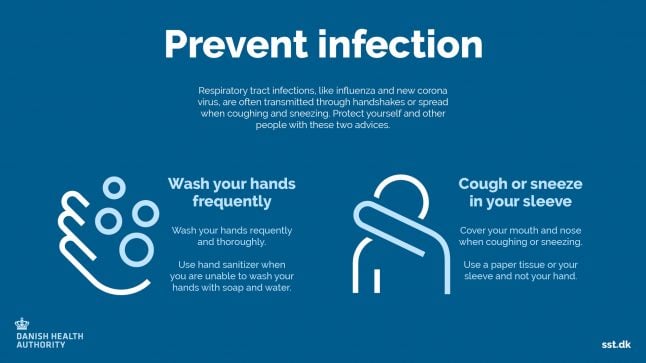**** Editor's note: Denmark's advice on use of face masks has changed since this article was published. SEE HERE for the current guidelines.
Although Copenhagen and Billund airports require passengers and staff to wear face masks, there is no general requirement for their use in public in Denmark.
That makes the country a relative outlier, with regulation in European countries including Germany, Italy, France and the United Kingdom requiring face masks to be worn in public spaces like shops and public transport.
In its guidance, the European Centre for Disease Prevention and Control says that “use of face masks in the community could be considered, especially when visiting busy, closed spaces, such as grocery stores, shopping centres, or when using public transport, etc.”
READ ALSO: Could face masks become compulsory in Denmark?
Denmark has not introduced mandatory general requirements for face mask use but the Danish Health Authority has issued guidelines to the public over how they can take precautions to minimise the risk of the virus spreading.
These “good habits” were recently mentioned by Minister of Health Magnus Heunicke as vital in keeping coronavirus infections in Denmark at their current low level. They are set out in detail below.
The Danish Health Authority sets out its guidelines into five general categories. They are:
1. Wash your hands often or use hand sanitiser
Proper hand hygiene is the most effective way to prevent contact spread, the health authority says. Therefore, regular hand washing with soap and water for 60 seconds or the use of hand sanitiser is advised.
Hands should always be washed after going to the bathroom, before cooking, before eating, after blowing your nose, after changing your baby's diaper and when you come home from work, shopping, etc.
Similarly, you should always avoid touching your face to prevent the virus from potentially entering your hands, nose or mouth.
2. Cough and sneeze into your sleeve
Or into a disposable tissue. Wash your hands afterwards.
3. Avoid handshakes, cheek kisses and hugs
Maintaining a social distance is still recommended – even if you have no symptoms.
4. Clean homes and workplaces regularly and thoroughly
The risk of contact spread increases dramatically when you touch contact point and surfaces that are touched by many people – such as door handles, bannisters, light switches, buttons, keyboards, armrests, table edges, taps, toilets and so on. These should therefore be cleaned or disinfected regularly.
The Danish Health Authority generally considers the risk of infection via textiles or clothing to be limited, but in households where someone is ill or suspected to have Covid-19, you should wash towels, bed linen and underwear at a minimum of 60 degrees.
5. Keep your distance and ask others to be considerate
Based on an assessment of current documentation, international recommendations and its own experience, the Danish Health Authority recommends at least a 1-metre distance between people in the public space and at least a 2-metres distance in situations where there might be an increased risk of droplet spread or where there are special considerations.
The latter situation might be one of the following:
- if you are anxious about your own or someone else’s respiratory symptoms
- when visiting nursing homes, hospitals or persons at higher risk
- during activities involving heavy exhalation where droplets are formed and scattered further away from the person than during normal speech, such as singing, shouting or exercise
- in confined spaces with limited room, poor ventilation, etc., such as basements or elevators.
Source: coronasmitte.dk, Sundhedsstyrelsen



 Please whitelist us to continue reading.
Please whitelist us to continue reading.
Member comments